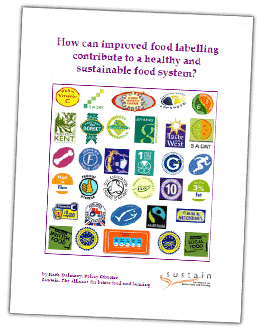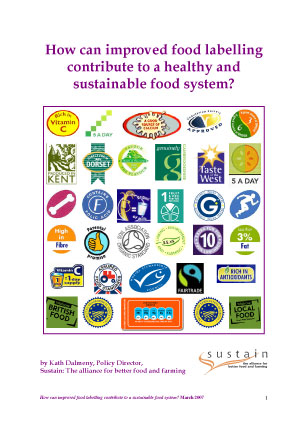Reports • Labelling for sustainability
How can improved food labelling contribute to a healthy and sustainable food system?
 Food labelling should help consumers to eat healthily and to use their buying power to support sustainable food and farming. However, food labelling is currently confusing, with new proposals to label food for health and sustainability hotly contested by the food industry and government.
Food labelling should help consumers to eat healthily and to use their buying power to support sustainable food and farming. However, food labelling is currently confusing, with new proposals to label food for health and sustainability hotly contested by the food industry and government.
This 36-page report was prepared as a technical submission to the Quality of Life Commission in 2007. It investigates the history and purpose of food labelling, and explores how food labelling could be used to support public policy goals, to improve health and the sustainability of the food system.
Improved food labelling is generally understood to be one of the tools for enabling a more sustainable food and farming system. It could prompt consumers to use their purchasing power to influence the development of social, environmental, health and animal welfare values in the food system. It could help to show which products support UK farming livelihoods and the market for local food. Provided in an appropriate format, it could also help to differentiate sustainable and less sustainable products; in turn providing added value, stimulating innovation and making sustainability a matter of competitive advantage.
However, there are no simple answers. Food labelling is a complex area, applied in a highly competitive and increasingly political marketplace, and scrutinised closely by regulatory bodies, the media and different interest groups. An observation arising from research for this paper is that there is a great deal of ‘baggage’ in terms of legal and other constraints on the information provided on food labels and in the multiplicity of voluntary, issues-based or brand-specific labelling schemes that have emerged over the years.
There are many excellent labelling schemes, such as the Marine Stewardship Council, Fairtrade and traffic-light nutrition labelling that can help consumers to make genuinely healthier or more ethical choices, and whose criteria are governed by robust principles in favour of health and sustainability. However, such admirable schemes sometimes face unfair competition from less robust labelling promotions that often seek to highlight one favourable aspect of a product (e.g. low fat) without being clear about less favourable aspects (e.g. high sugar).
The clear message emerges: If policy-makers wish to recommend or require changes to food labels, then they must be absolutely clear about what they are seeking to achieve. Solutions and techniques are available to make labelling work for consumers and to support public policy goals. But these need government leadership to ensure that they applied systematically across the country.
Report contents
1. Food labelling for sustainable food and farming: introduction
2. Sustainable food: definitions
- What is ‘sustainability’?
- What are ‘local’, ‘regional’ and ‘sustainable’ foods?
- What types of food are labelled?
3. The growing market for sustainable food
4. What can labelling achieve?
5. Types of food labelling already in use or in development
-
Farm assurance labelling schemes
- Opportunities and limitations for promoting sustainability with the Little Red Tractor
-
Labelling for traceability
- Labelling of animal carcasses
- Labelling of meat at wholesale
- Labelling of meat for retail
- Special labelling rules for beef
- Opportunities and limitations for promoting sustainability through red meat labelling
- Egg labelling
- Opportunities and limitations for promoting sustainability through egg labelling
- Sustainable fish labelling
- Opportunities and limitations for promoting sustainable fish
- Fairtrade labelling
- Labelling relating to pesticide residues and traceability
-
Provenance labelling
- European protected provenance labelling
- Opportunities and limitations of promoting sustainability with European provenance labelling
- Supermarket and other retail labelling of local and regional foods
- Provenance labelling by regional food groups
- Opportunities and limitations for promoting sustainability with supermarketand regional food group ‘local food’ labelling
- Certificate of Provenance
- Opportunities and limitations for promotion of sustainability with a Certificateof Provenance
- Can provenance labelling be misleading?
- Labelling for ‘food miles’
- Labelling for carbon dioxide and other greenhouse gas emissions
- Labelling for broader sustainability values
- Nutrition labelling
6. What is needed to improve food labelling for sustainability?
7. Other publications on food labelling and marketing

How can improved food labelling contribute to a healthy and sustainable food system?
36pp - 2007 | 1698Kb
Published Thursday 1 March 2007
Labelling for sustainability: Sustain has worked on nutrition and sustainability labelling issues since the alliance was established in 1999.